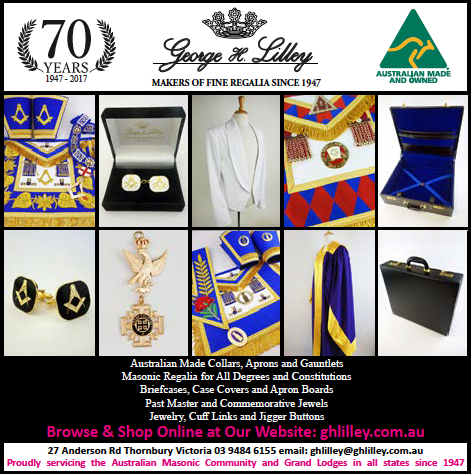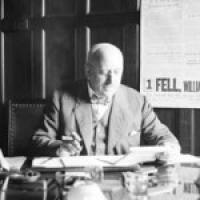Who was Scott Fell?
31 August 22
In a chapter from his coming book The Lodge above the Baker’s Shop, VW Bro Alan Gale tells the story of W Bro William Scott Fell, a ‘colourful character’ of the early 1900s.
Below - The Scott Fell mansion Carrickfergus at what is now 46 Parriwi Rd Mosman, overlooking Middle Harbour. The house is still there and is Heritage Listed. Courtesy State Library NSW 
So who was William Scott Fell PM? Clearly a man who lived the Arthur Daley slogan ‘let me do it right for you’ to the absolute.
A multiple bankrupt, ship broker and coal merchant, Member of Parliament, local councillor, serial litigant, community leader, second Master of Lodge Mosman No 228 (1901-02) and a member and Lodge trustee until his death in 1930.
A 1910 judgement against him described him as ‘having a chequered business career’ with the judge stating ‘it appears to me to be impossible to accept him as a straightforward, honest, and sincere witness, however plausible his demeanour.’
Not the best description to be given of a notable and seemingly upstanding Freemason and pillar of his local community.
But this finding, like many others against him, was overturned on appeal to the High Court.
He’s probably one of the few Freemasons to have a High Court test case taught to law students as a precedent: that in cases of misrepresentation, silence does not connote consent (1906, W Scott Fell and Co vs Lloyd).
Mosman was definitely his chief area of influence, where he served as a church trustee, a local philanthropist, one of the strongest financial supporters of Lodge Mosman from its foundation in 1900, became heavily involved in community affairs and hailed from a family of high achievers.
His brother, David, also a state MP (Lane Cove), founded the Australian Corporation of Public Accountants and was instrumental in ensuring the welfare arrangements for returned soldiers were greatly increased in the aftermath of World War I.
 Cousin John founded the oil industry in Australia (he built refineries at Greenwich and Clyde and founded the shale oil project at Newnes); and probably earns the wrath of every swimming pool owner by being responsible for the propagation and spread of jacarandas from his house in Northwood, which also hosted the foundation meeting of the Australian Red Cross.
Cousin John founded the oil industry in Australia (he built refineries at Greenwich and Clyde and founded the shale oil project at Newnes); and probably earns the wrath of every swimming pool owner by being responsible for the propagation and spread of jacarandas from his house in Northwood, which also hosted the foundation meeting of the Australian Red Cross.
There is a saying that you only fall off the edge once your toes lose their grip. Scott Fell definitely had long, prehensile toes.
He was a serial litigant, pursuing and having a great deal of success appealing against adverse financial judgements in the High Court. There are newspaper mentions of at least 10 High Court appeals in his name.
For example, that scathing judgement of 1910 was overturned on appeal and the judge was admonished for the way the trial was handled. His family business of ship broking, coal mining and sales and land development prospered despite his own clearly colourful style of business practice.
 The repeated bankruptcies did not prevent him having access to wealth – all kept safely in the name of his wife and sons. Elected an Alderman of Mosman Council in February 1908, he resigned in November that year, his estate having been seized and his being declared a bankrupt owing £7,956.
The repeated bankruptcies did not prevent him having access to wealth – all kept safely in the name of his wife and sons. Elected an Alderman of Mosman Council in February 1908, he resigned in November that year, his estate having been seized and his being declared a bankrupt owing £7,956.
<---William Scott Fell working at his desk, circa 1927.
Courtesy State Library NSW
Nevertheless, the eponymous shipping company kept trading (he was an employee, not the owner) and the money kept rolling into the family coffers – just not into his.
In one court case, the on-paper owner of the company, a Mr Lane, was described as ‘but a dummy for Scott Fell’. Again overturned on appeal.
A contemporary newspaper report describes him thus: ‘Closely associated with patriotic movements during the war, he always showed himself firmly opposed to Bolshevism. For many years he occupied the position of president of the British Empire Union of Australia, is a fellow of the Royal Geographic Society and a Freemason. His recreations are golf and swimming.’
As an Independent Liberal, Fell failed in bids for the NSW Legislative Assembly seats of Middle Harbour in 1907 and Mosman in 1913. In 1922 he won North Shore as an independent coalition candidate. In 1926 he slandered fellow-politician Alfred Reid, was sued for £3,000 and was ordered to pay £30 (clearly the jury had a cynical opinion of the public reputation of politicians).
He resigned in 1927 to contest a Federal by-election for Warringah but lost. He was described by the Bulletin (10 September 1930) as ‘a go as-you-please Nationalist, with stubborn views of his own on most subjects’.
As he frequently said in speeches when his character was traduced: ‘there have been many claims made about me, but time and time again my name has been cleared by the highest court of Australia’.
Clearly, that’s how he managed to maintain a long membership of Freemasonry that enabled him to ensure Mosman Masonic Centre (constructed in 1911 and consecrated in 1912) was well financed.
As the 1911 minutes note: ‘Special reference must be made to the activities of Worshipful Brother Scott Fell who was mainly instrumental in raising the money necessary to proceed with the work. Payment was met partly by loan and partly by the issue of debentures to members.’
Unsurprisingly, he was a trustee of the Lodge until his death in 1930.
He died in his Macquarie Street home in September 1930, is buried in the Presbyterial section of Manly Cemetery and left an estate of £54,601.
Considering his Mosman house, Carrickfergus, was valued at £4,250 in 1930 and the average house price in Mosman is now $4.75m, that’s a contemporary purchasing power of $61.75m.
Not bad going at all.



